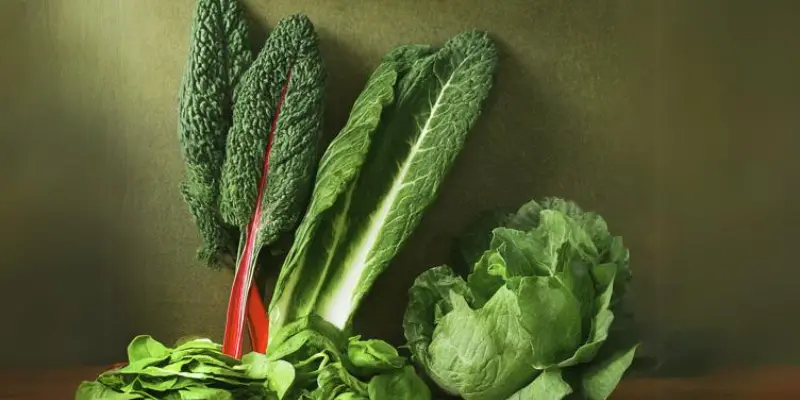Discovering the Best and Healthiest Leafy Green Vegetables”
Published: 10 Feb 2024
One of the most influential and delicious ways to maintain health is incorporating leafy green vegetables into your diet. In this blog post, we will highlight the leafy green vegetables that have the most nutrients. From the powerhouse kale to the underrated Swiss chard, these leafy greens are not just tasty additions to your meals but also your partners in promoting optimal health and well-being. So, whether you’re already a fan or curious to learn more, this blog post will remain helpful for you.

Kale: A Superfood
A Packed Punch of Nutrients
Kale is truly a superfood vegetable. This leafy green is among the most nutrient-dense vegetables. It packs vitamins A, C, and K, along with essential minerals and antioxidants, into your diet with just one serving of this superfood. It’s quite the nutritional punch.
Vitamin K
It’s worth highlighting the high content of vitamin K in kale. It plays a pivotal role in enabling your blood to clot. But its benefits continue beyond there. Vitamin K is also beneficial for bone health. If you’re looking to support your bones as you age, kale could be a perfect addition to your eating habits.
Best Way to Consume Kale
Now, how should you go about consuming this powerhouse of nutrients? If I suggest the best way, raw kale is the way to go. Cooking kale may reduce its nutrient content, and we wouldn’t want that, would we? Remember, every nutrient counts when we’re talking about optimizing our health.
The Kale Conclusion
In conclusion, if you’re looking for a healthy diet addition that’s packed full of essential nutrients, then kale is the best choice. With its high concentrations of vitamins, minerals, and antioxidants, it stands out as a superfood. And remember, raw is the way to go to keep those nutrients intact.
Microgreens
Microgreens might be tiny, but they are mighty when it comes to their nutritional value. These miniature greens, harvested when the first true leaves develop, pack a powerful punch of nutrients. In fact, they’re known to contain up to 40 times more nutrients than their mature counterparts. That’s right, they’re tiny, but they’re complete with essential vitamins and minerals, making them a perfect addition to any healthy diet.
Microgreens are nutrient-dense:
This is due to their high concentration of vitamins, particularly vitamins C, E, and K. Additionally, they’re packed with minerals and antioxidants that are beneficial for our overall health. Microgreens are tiny but full of nutrition.
Uses of Microgreens
Microgreens can be used for your salad, sandwich, or smoothie. They add a burst of flavour and a nice crunch to any dish. They’re a great way to boost the nutritional value of your meals without adding many calories.
Easy to grow at home:
Microgreens are also incredibly easy to grow at home. They only need a little space and are usually ready to harvest within two to three weeks. Growing your microgreens means you’ll always have a fresh supply of these nutritional powerhouses at hand.
To sum up, they are teeming with nutrients, easy to add to meals, and can be quickly grown at home. With all these benefits, it’s clear that these tiny greens hold a lot of power.
Collard Greens
Collard greens are a powerhouse of nutrition that provides substantial health benefits. As part of the cruciferous vegetable family, they are known for their distinctive taste and high nutrient content.
Rich Source of Vitamins and Minerals
Collard greens are packed with essential vitamins and minerals. They are a significant source of calcium, which is very important for bone health. They are high in vitamins A, C, and B9 (folate), which contribute to eye health, immune function, and cell growth, respectively. But it’s the outstanding vitamin K content that sets collard greens apart. A single cup of cooked collard greens provides an incredible 1,045% of the Daily Value for vitamin K, a nutrient vital for blood clotting and bone health.
Low in Calories and High in Fiber
Collard greens are low in calories. Therefore, they play an essential role in weight loss or maintaining a healthy weight. Additionally, they are high in fibre, aiding digestion and promoting feelings of fullness, which can prevent overeating.
Versatility in Cooking
They can be sautéed, steamed, or even used as a wrap for a low-carb, nutrient-dense alternative to bread or tortillas.
Incorporating collard greens into your diet not only adds variety but also significantly boosts your intake of essential nutrients. This leafy green is clearly more than just a side dish; it’s a nutrient-dense superfood that contributes to overall health and well-being.
Swiss Chard: A Nutrient Powerhouse
Swiss chard is a leafy green vegetable that demands your attention due to its impressive nutritional profile. This vibrant vegetable is packed with vitamins, minerals, and antioxidants, making it an excellent choice for anyone seeking nutrient-dense foods.
It’s particularly rich in vitamins A, C, and K, and it also offers a substantial amount of magnesium, potassium, and iron. With this mix of vitamins and minerals, Swiss chard provides a perfect blend for promoting optimal health and well-being.
Swiss chard does more than pack a punch in the nutrient department. It also offers several health benefits that warrant its place in your diet. Swiss chard supports heart health, promotes healthy blood clotting provides essential nutrients for overall well-being. When you eat Swiss chard, you are not just eating a vegetable; you are investing in your health.
It can be sautéed with a bit of garlic and olive oil for a tasty side dish, steamed and tossed into a salad, or even used as a substitute for spinach in recipes.
With its rich blend of vitamins and minerals, along with its versatility in the kitchen, Swiss chard is a leafy green that deserves a regular spot in your diet.
Spinach a Nutrient-Rich Green
Spinach is a leafy green that is well-known worldwide and has earned its reputation as a nutritional powerhouse. Low in calories and high in vitamins and minerals, spinach is a go-to for health-conscious individuals. It is particularly rich in vitamins A, C, and K, along with iron and calcium. These nutrients play vital roles in promoting our overall well-being, from supporting eye health to maintaining healthy blood pressure levels.
Supporting Digestive Health
One of the many virtues of spinach is its ability to promote digestive health. This vegetable is rich in dietary fibre, which aids in digestion by adding bulk and softness to the stool. It can help avoid constipation and maintain a healthy digestive tract as someone who values a smoothly functioning digestive system.
A Staple for Healthy Diets
Beyond its nutritional benefits, spinach is a staple in many healthy diets. From low-carb and keto to vegan and paleo, you’ll find spinach included in various health-focused meal plans. With its low-calorie content and high nutrient density, it’s a smart choice for those looking to maintain a balanced diet. In a world filled with fast food options and processed snacks, I find it comforting to have a reliably healthy option like spinach.
The Power of Spinach
Its versatility, combined with its potent nutrient profile, makes it a top choice among leafy green vegetables. Whether you’re looking to support your eye health, maintain healthy blood pressure, or ensure a smoothly functioning digestive system, spinach can be your ally. Remember, every leaf counts.
Other Noteworthy Leafy Green Vegetables
Besides the leafy greens that we’ve already discussed, there are a handful of others that deserve your attention for their rich nutritional content. These veggies are not just “also-rans” but indeed pack a punch when it comes to delivering vitamins, minerals, and antioxidants.
Arugula
This peppery green is more than just a favourite in Italian cuisine. It’s low in sugar, calories, carbohydrates, fat and high in several vital nutrients like calcium, potassium, folic acid, and vitamins C, K, and A.
Beet Greens
The leafy tops of beets are rich in fibre, Vitamin K, copper, manganese, iron, and calcium. Cooking these greens is easy and can be done much the same way as you would spinach or collard greens.
Bok Choy
Also known as Chinese cabbage, bok choy is a cruciferous vegetable like kale, broccoli, and cauliflower. It’s packed with fibre, protein, and a slew of vitamins and minerals, such as Vitamins A, C, and K, and calcium.
Broccoli Rabe
Broccoli rabe (also known as rapini) is not broccoli but a relative of the turnip. This bitter green is filled with vitamins A, B, C, and K, as well as potassium, calcium, and iron. It’s beloved in Italian and Portuguese cuisine.
Dandelion Greens
Its leaves are edible. They’re also incredibly nutritious and packed with Vitamins A and K; these greens can provide more than 500% of your daily recommendation in just one cup.
Cabbage
Versatile veggies are low in calories and high in fibre. It is an excellent source of Vitamins C and K. It can be eaten raw and cooked.
Incorporating a variety of these leafy green vegetables into your diet will ensure a diverse range of essential nutrients, boosting your overall health and well-being.
The Health Benefits of Leafy Green Vegetables
Eating leafy green vegetables leads to significant health improvements. These vibrant veggies are much more beneficial for your health. They’re chock-full of vitamins, minerals, and fibre, all while being incredibly low in calories.
Leafy greens are a fantastic defence against obesity. The high fibre content in these vegetables helps you feel full faster and longer, reducing the likelihood of overeating. Plus, they’re low in calories.
Leafy greens can play a role in heart health. Studies have shown a diet rich in these vegetables can reduce the risk of heart disease. They’re packed with heart-healthy nutrients like potassium, which can help manage blood pressure and antioxidants that fight inflammation. It’s a small change to your diet that can make a significant impact on your heart’s health.
These vegetables have potential benefits to brain function. As we age, maintaining mental sharpness becomes increasingly essential. Again, leafy green vegetables come to the rescue. They’re rich in antioxidants and other nutrients known to support brain health, potentially slowing cognitive decline.
Conclusion
In conclusion, leafy green vegetables are a fantastic addition to any diet, and they provide a variety of flavors and textures to keep your meals interesting. They also offer an incredible array of health benefits. From the antioxidant-rich kale to the nutrient-dense Swiss chard, each leafy green has its unique profile of vitamins, minerals, and beneficial compounds. Microgreens pack a powerful punch of nutrients in a tiny package; while versatile spinach can be used in everything from salads to smoothies, collard greens are also a fantastic source of essential nutrients.
The blog post highlights the most nutritious and versatile leafy green vegetables, including kale, microgreens, collard greens, Swiss chard, and spinach.
Kale is packed with vitamins A, K, and C and is an excellent source of minerals like manganese. Furthermore, it has antioxidant properties, which can boost your immune system and support heart health.
Microgreens are nutrient-dense and have a higher concentration of vitamins and antioxidants compared to their mature counterparts. They can help in reducing the risk of heart disease, Alzheimer’s, and diabetes.
Swiss chard is high in vitamins K, A, and C and also provides a good amount of magnesium, potassium, iron, and dietary fibre. It supports bone health and boosts immunity.
Besides its high nutritional value, spinach can be consumed in a variety of ways. It can be eaten raw in salads, cooked in soups and dishes, or blended in smoothies.
The blog post also mentions other leafy green vegetables such as Arugula, romaine lettuce, and mustard greens, all of which are nutritious and beneficial for your health.
Regular consumption of leafy green vegetables has a number of health benefits, from strengthening the immune system to improving bone health, supporting heart health, and aiding in digestion. They also provide essential vitamins and minerals needed for overall health and well-being.

- Be Respectful
- Stay Relevant
- Stay Positive
- True Feedback
- Encourage Discussion
- Avoid Spamming
- No Fake News
- Don't Copy-Paste
- No Personal Attacks



- Be Respectful
- Stay Relevant
- Stay Positive
- True Feedback
- Encourage Discussion
- Avoid Spamming
- No Fake News
- Don't Copy-Paste
- No Personal Attacks



